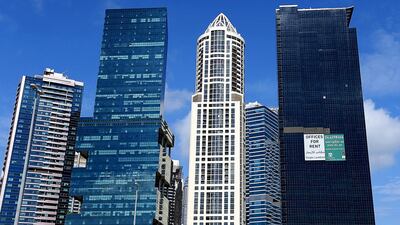Prime office rents in central Dubai jumped 25 per cent during the 12 months to the end of September as the hard-hit office market continued to recover on the back of demand from banks, developers and airlines.
Grade A office rents rose 8.7 per cent from the second quarter to an average of Dh250 per square foot, according to a report from the property broker Cluttons.
It found that the core business district – the DIFC, Downtown Dubai and Sheikh Zayed Road – remain the most expensive offices in the city, where most Grade A space lets for between Dh220 and Dh280 per sq ft.
“Following the usual summer slowdown, the market has regained its strength, with strong demand persisting for well-located space,” said Steve Morgan, the chief executive of Cluttons Middle East.
“Across the business sectors, the office market remains very active in all segments,” he added. “We have been recording a steady rise in take-up by both existing and new occupiers, with the banking and financial services, real estate and aviation sectors being among the most notable.”
Earlier this year Tecom, which operates Dubai Internet City, Dubai Media City and Dubai Knowledge Village, increased rents and service charges by as much as 43 per cent in some areas.
The increase in demand also meant that rents for secondary office space rose by a staggering 18.2 per cent during the third quarter to stand at Dh130 – a 44 per cent jump on the previous year, Cluttons said.
Office rents plummeted after the global financial crisis, crashing from more than US$100 per sq ft a year in 2008 to less than $38 per sq ft in 2011 as many occupiers disappeared or fled, leaving vast swaths of empty blocks across the city. Many of these blocks remain in multiple ownership and so are unattractive to large office tenants.
Cluttons said that now the office vacancy rate was slowing, demand was starting to return to areas such as Business Bay, where many half-built office blocks remain stalled or not yet started. It said land values in Business Bay had risen from between Dh200 and Dh250 per sq ft in 2012 to about Dh400 per sq ft today.
Property brokers predicted that although Dubai’s housing market could well be hit by the plummeting global oil price, office and industrial rents should remain unaffected.
“Historically, there has been a reasonably strong correlation between the Dubai Financial Market General Index and residential property prices; if this relationship holds, home prices in the emirate should continue to trend down in Q4 2014,” said Harmen De Jong, the director of development consultancy and research at Knight Frank.
“Commercial property, though, should be relatively resilient given that firms tend to take a medium to long-term view – which continues to look positive for the GCC – when launching expansion plans,” he said.
lbarnard@thenational.ae

